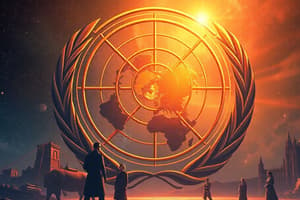Podcast
Questions and Answers
संयुक्त राष्ट्र संगठन किस उद्देश्य से स्थापित किया गया था?
संयुक्त राष्ट्र संगठन किस उद्देश्य से स्थापित किया गया था?
- सैन्य शक्ति को परमाणु युद्ध के लिए बढ़ावा देने के लिए
- विश्व शांति और सहयोग को बढ़ावा देने के लिए (correct)
- कृषि और उपहारों के व्यापार में सहायता करने के लिए
- ऑस्ट्रेलिया में समृद्धि को बढ़ाने के लिए
संयुक्त राष्ट्र संगठन की मुख्य सिद्धांतों में से एक कौन-सा है?
संयुक्त राष्ट्र संगठन की मुख्य सिद्धांतों में से एक कौन-सा है?
- संघर्ष
- सामूहिक सुरक्षा (correct)
- समृद्धि
- संकल्पशक्ति
संयुक्त राष्ट्र संगठन की मुख्य सीमा कहाँ पर स्थित है?
संयुक्त राष्ट्र संगठन की मुख्य सीमा कहाँ पर स्थित है?
- मॉस्को, रूस
- पेरिस, फ्रांस
- लंदन, यूनाइटेड किंगडम
- न्यूयॉर्क सिटी, संयुक्त राज्य अमेरिका (correct)
संयुक्त राष्ट्र संगठन की मुलाकात कहाँ पर होती है?
संयुक्त राष्ट्र संगठन की मुलाकात कहाँ पर होती है?
संयुक्त राष्ट्र का सबसे बड़ा आरोप क्या है?
संयुक्त राष्ट्र का सबसे बड़ा आरोप क्या है?
कौन-कौन से देशों को स्थायी सीटें और वेटो शक्ति होने की मान्यता है?
कौन-कौन से देशों को स्थायी सीटें और वेटो शक्ति होने की मान्यता है?
किस कारण से संयुक्त राष्ट्र का संरक्षण मिशनों पर सवाल उठाए गए है?
किस कारण से संयुक्त राष्ट्र का संरक्षण मिशनों पर सवाल उठाए गए है?
संयुक्त राष्ट्र के संरक्षण मिशनों में समस्याएं कितनी है?
संयुक्त राष्ट्र के संरक्षण मिशनों में समस्याएं कितनी है?
संयुक्त राष्ट्र का मुख्य उद्देश्य क्या है?
संयुक्त राष्ट्र का मुख्य उद्देश्य क्या है?
संयुक्त राष्ट्र कौन-कौन से मुख्य अंगों से मिलकर बना है?
संयुक्त राष्ट्र कौन-कौन से मुख्य अंगों से मिलकर बना है?
कौन-कौन से संगठन UN के मुख्य कार्यों को संपादित करते हैं?
कौन-कौन से संगठन UN के मुख्य कार्यों को संपादित करते हैं?
UN की महासभा के क्या कार्य होते है?
UN की महासभा के क्या कार्य होते है?
Flashcards are hidden until you start studying
Study Notes
Contemporary Centres of Power: The United Nations
The United Nations (UN) is a global intergovernmental organization that was established on October 24, 1945, with the aim of promoting peace and cooperation between its member states. The UN is one of the most significant contemporary centers of power, with its headquarters located in New York City, United States. The organization has evolved over the years, and its influence has expanded to various aspects of international relations, including peacekeeping, human rights, and international law.
Foundational Principles
The UN was formed based on the principles of peace, cooperation, and international law, as outlined in the Charter. The organization's core principles include:
- Collective Security: The UN commits to prevent conflict and maintain peace in the world through international cooperation and collective action.
- Global Cooperation: The UN facilitates cooperation among its member states to tackle global challenges, such as climate change, poverty, and disease.
- Human Rights: The UN promotes and protects human rights worldwide, ensuring that all individuals are treated with dignity and respect.
- International Law: The UN upholds and advocates for the principles of international law, ensuring that states and individuals adhere to treaties and agreements.
Structure and Functions
The UN is composed of six main organs: the General Assembly, the Security Council, the Economic and Social Council, the International Court of Justice, the Secretariat, and the Trusteeship Council. Each organ plays a unique role in the organization's operations:
- General Assembly: The legislative branch of the UN, consisting of all member states, which meets annually to discuss and adopt resolutions on various issues.
- Security Council: The executive branch of the UN, responsible for maintaining international peace and security, with the power to authorize peacekeeping missions.
- Economic and Social Council: The organ promoting international economic and social cooperation, with the power to make recommendations to member states.
- International Court of Justice: The judicial branch of the UN, responsible for settling disputes between member states.
- Secretariat: The administrative branch of the UN, providing support and services to the other organs.
- Trusteeship Council: The organ overseeing the administration of trust territories under the UN.
Challenges and Criticisms
The UN has faced numerous challenges and criticisms throughout its history, including:
- Inadequate Representation: The UN's structure has been criticized for not adequately representing the interests of smaller and developing countries.
- Structural Imbalance: The Security Council, which holds significant power in the organization, is criticized for its unequal representation of member states, with some countries holding permanent seats and veto power.
- Economic and Political Influence: The UN has been criticized for being influenced by the economic and political interests of its more powerful member states.
- Peacekeeping Missions: The UN's peacekeeping missions have faced criticism for their effectiveness in maintaining peace and security, as well as their impact on local populations.
Impact and Legacy
Despite its challenges and criticisms, the UN has had a significant impact on international relations and global issues. Some of the organization's most notable achievements include:
- Peacekeeping: The UN has deployed peacekeeping missions in over 100 conflicts, preventing the loss of more than 100,000 lives.
- Humanitarian Aid: The organization has provided aid to over 100 million people affected by natural disasters, armed conflicts, and other crises.
- Climate Action: The UN has played a crucial role in promoting global efforts to combat climate change, including the Paris Agreement.
- Human Rights: The UN has established various mechanisms and treaties to promote and protect human rights worldwide.
In conclusion, the United Nations is a powerful contemporary center of power, with a significant impact on international relations and global issues. While the organization has faced numerous challenges and criticisms, its achievements in peacekeeping, humanitarian aid, climate action, and human rights have solidified its place as a vital player in shaping the global landscape.
Studying That Suits You
Use AI to generate personalized quizzes and flashcards to suit your learning preferences.



